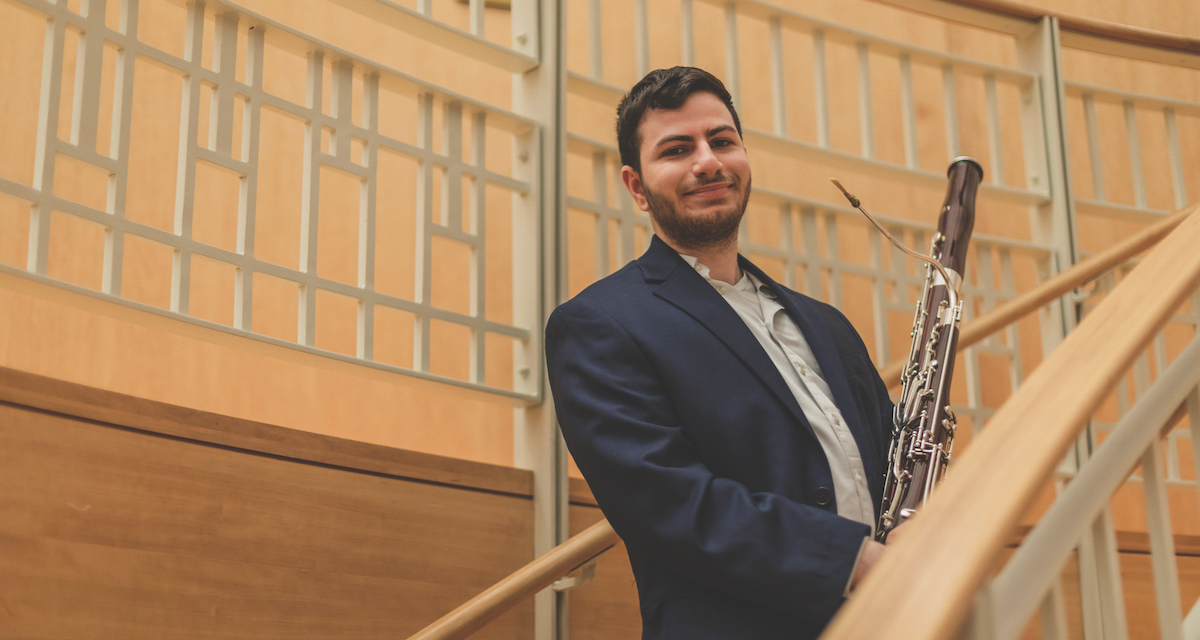The Sanctuary of Songwriting During SARS-COV-2
This article originally appeared in the fall 2021 issue of STILLPOINT magazine
While people were baking homemade sourdough bread, adopting pets and remodeling bathrooms to make the most of being stuck at home during the pandemic, music performance major Shant Arakelian ’21 was composing a six-movement sonata about his life. “It’s like a memoir in terms of music. Every note, every rhythm came from above,” says Arakelian, who wrote the sonata for his senior bassoon recital.
The whole project spanned his year of remote learning. He was one of the hundred or so students who chose to go fully remote for fall 2020 and spring 2021. Arakelian spent most of his time in his basement bedroom in his family’s Lexington, Massachusetts, home. Each note of his sonata was like a tally mark left by a shipwrecked castaway, reminding Arakelian of how many days and months had passed since the pandemic began.
“Finishing the sonata was not an easy task,” says Arakelian. “It can be a challenge to compose, as I am easily distracted.” His brain processes stimuli differently because of attention deficit and hyperactivity disorder (ADHD), which is something he was diagnosed with as a child. He explains that his brain moves quickly and frequently shifts focus, which is why it can take him a long time and to finish big projects like composing a sonata. Throughout his time at Gordon, Arakelian was mentored by Ann Seavey ’75 at the Academic Success Center (ASC), who helped him to understand his unique way of processing and making sense of information, so he could stay on top of his classes and create some structure for his creative and restless mind.
He’s been composing his own musical pieces for nine years, but this sonata is something unconventional, says Arakelian. Traditional sonatas are three movements, maybe the occasional four. His has six of them. Each movement is like a song on an album; it’s a piece that can stand alone but is part of a greater body of work. In classical music, each movement is distinguishable from the next because of its unique form, key, tone and pace (slow, medium or fast).
Because this sonata is about Arakelian’s life, each movement is autobiographical as well. For example, the first movement draws on themes found in Armenian music, hinting at Arakelian’s Armenian heritage and family history. (His great grandparents were survivors of the Armenian genocide that took place over 100 years ago.) The fourth movement is a tribute to his grandfather. And the sixth and final movement is expansive, moving out from Arakelian’s own life to tell the story of a community more than 5,000 miles away. “It’s a tribute to the people and soldiers of Artsakh. That one’s the longest,” he says.
Artsakh is the name Arakelian uses for a mountainous region known more commonly as Nagorno-Karabakh, a territory that’s been fought over by Armenia and Azerbaijan for centuries. Last summer, the hostilities erupted into a violent six-week war, in which 5,000 lives were lost, along with hundreds of homes, schools and hospitals. “Had this event not happened, I probably would’ve come up with something shorter,” says Arakelian.
The length of his sonata was driven by his emotions—at least the ones he had felt most powerfully when looking back on his life and the pandemic. The act of creating such an ambitious piece of music was therapeutic for him.
“In a lot of the movements, there is anger, sadness, a little bit of happiness. There’s something foreboding. There’s a lot going on,” admits Arakelian. “Music brings the emotions out of everyone, myself included. One quote I especially like that sums it up well is this: ‘Music expresses that which cannot be put into words and that which cannot remain silent.’ That’s Victor Hugo.”
Now that his sonata is complete, Arakelian is ready for his next big project. His plans, as of now, are to work toward an understudy position with a professional orchestra or to find a job related to music arranging and transcription. Whatever happens, Arakelian’s not done with writing music. “I’ve even started composing my own opera,” he says. “It’s in the beginning stages.”
 The Bell
The Bell